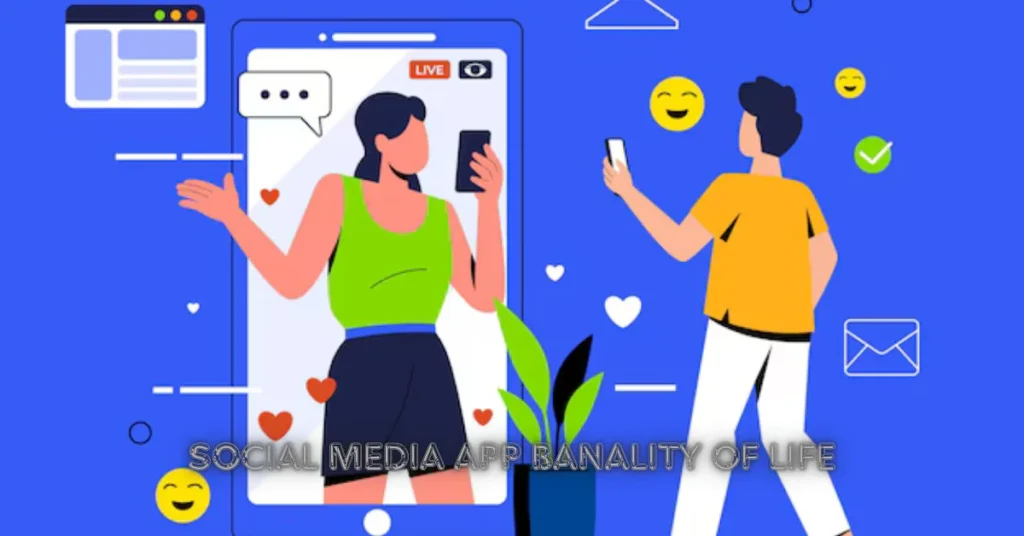Introduction to the Monotony of Daily Feeds
In a world dominated by social media app banality of life our daily feeds can feel like an endless loop of the same faces, memes, and curated lifestyles. Every swipe brings us another photo of brunch or yet another influencer’s perfectly staged life. This saturation creates a peculiar phenomenon—the banality of life. Our once vibrant connections are now reduced to pixelated snapshots that blur the line between reality and performance.
As we scroll through posts filled with filtered smiles and hashtagged adventures, it’s easy to lose sight of what truly matters. The monotony can be both comforting and suffocating. Have we become so accustomed to this routine that we’ve forgotten how to engage deeply with one another? It’s time to explore the implications behind our digital habits and their effects on our well-being in this fast-paced online landscape.
The Addiction of Scrolling
Scrolling has become a reflex for many. It’s as if our fingers have minds of their own, gliding over screens without thought. The moment we unlock our phones, we dive headfirst into an endless stream of content.
Every notification pulls us in deeper. A new post here, a viral video there—each scroll promises something different yet predictable. We chase after likes and shares like moths to a flame.
This constant influx creates a dopamine rush that can be hard to resist. The thrill is fleeting but addictive, leading us back time and again for another hit of validation or entertainment.
Moments turn into hours while real life slips away unnoticed. Tasks pile up, relationships fade into the background—all because the feed beckons us with its siren song of distraction and delight.
The Impact on Mental Health
The constant barrage of curated images and highlight reels can create a distorted perception of reality. Users compare their lives to the seemingly perfect experiences shared by others, leading to feelings of inadequacy.
This comparison trap is particularly dangerous for young people. It fosters anxiety and depression as they grapple with unrealistic expectations. The pressure to present an idealized self can be overwhelming.
Moreover, endless scrolling often replaces real-life interactions. Virtual connections lack the depth that face-to-face conversations provide. This detachment contributes to loneliness, even in a sea of ‘friends.’
Studies show that excessive social media use can disrupt sleep patterns too. Late-night scrolling affects mental clarity during the day, fueling irritability and stress levels.
In this landscape, it’s essential to recognize how these digital behaviors impact emotional well-being. Awareness is the first step toward reclaiming one’s mental health amidst the noise.
The Loss of Authentic Connection
social media app banality of life platforms promise connection, yet often deliver isolation. The curated lives displayed by others can create a false sense of intimacy. We scroll through feeds filled with perfect moments, sidelining the genuine interactions we crave.
In our quest for likes and validation, meaningful conversations are lost. Texts replace face-to-face chats. Emojis stand in for laughter and tears. This shift distances us from real understanding.
Friendships become transactional—likes exchanged instead of shared experiences. As we chase fleeting trends online, deeper bonds fray at the edges.
We may feel surrounded by acquaintances but starved for authenticity. Genuine connections thrive on vulnerability and presence, which get diluted in endless digital chatter.
Amid this banality lies an opportunity to reclaim what matters: human connection that nourishes our souls rather than depletes them.
Social Media Detox and its Benefits
A social media app banality of life detox can be a refreshing escape from the endless scroll. By stepping away, you give your mind a chance to breathe and reset.
During this break, you’ll start to notice how much time you really have. It opens up space for hobbies and activities often overshadowed by notifications and updates. Reading, exercising, or even just enjoying nature becomes more accessible.
You may also find clarity in your thoughts. Without the constant barrage of content, it’s easier to reflect on what truly matters in your life.
Social interactions feel more genuine when not filtered through screens. Reconnecting with friends face-to-face fosters deeper relationships that digital likes can’t replicate.
As days pass without scrolling through feeds, anxiety levels often decrease too. You might rediscover self-acceptance as comparisons fade into the background noise of daily life.
Tips for Breaking the Cycle
Designate screen-free times during your day. Start small—perhaps an hour in the morning or before bed. This simple act can create space for other activities.
Engage in hobbies you love or discover new ones. Painting, reading, or hiking can fill the void left by compulsive scrolling and spark joy.
Try a social media app limit on your devices. Most smartphones have features that track usage. Set daily goals to gradually reduce time spent online.
Connect face-to-face with friends and family more often. Real conversations deepen relationships far beyond what a screen can offer.
Mindfulness practices like meditation help ground you in the present moment. Focusing on your breath nurtures awareness of life outside digital feeds.
Consider journaling your thoughts and feelings about social media use. Documenting experiences may reveal patterns worth addressing while providing clarity and insight into your habits.
Finding a Balance in the Digital Age
Navigating the digital landscape requires a thoughtful approach. It’s easy to get swept away in endless scrolling. Yet, finding balance is essential for overall well-being.
Set boundaries for your social media usage. Designate specific times of day to check updates and stick to them. This creates structure and minimizes mindless browsing.
Engage with content that enriches your life. Follow accounts that inspire you or challenge your thinking rather than those that leave you feeling drained.
Consider offline activities as alternatives to screen time. Go for a walk, read a book, or spend quality moments with loved ones. These experiences can ground you in reality.
Practice mindfulness while online too. Pause before reacting to posts or comments; it cultivates deeper connections and thoughtful interactions instead of fleeting responses.
Balancing technology with real-world engagement fosters fulfillment in both realms without losing sight of what truly matters.
Conclusion
The prevalence of social media app banality of life has reshaped how we interact with the world around us. Daily feeds filled with repetitive content can lead to a sense of monotony that dulls our experience. This digital landscape, while connecting us superficially, often leaves us feeling isolated.
Breaking free from this cycle is vital for nurturing authentic connections and enhancing overall well-being. Embracing occasional detoxes and finding balance in our online habits can transform our engagement with social media into something more meaningful. By being mindful about what we consume and share, we open ourselves up to richer experiences beyond the screen.
Life is vibrant outside those daily feeds. Exploring real-world interactions and hobbies can reclaim joy that may have been lost in scrolling endlessly through curated lives. It’s time to redefine our relationship with technology and rediscover the beauty of genuine human connection amidst the social media noise.
FAQs
What is “social media app banality of life”?
“Social media app banality of life” refers to the monotonous and repetitive nature of content encountered on social media platforms. It highlights how daily feeds often feature similar types of posts—like food photos or vacation snapshots—which can make social media interactions feel predictable and dull.
How does social media contribute to the monotony of daily life?
Social media contributes to monotony by presenting a constant stream of similar content, creating a repetitive experience for users. This saturation of comparable posts can lead to a sense of sameness and diminish the excitement that once accompanied social media engagement.
What impact does the repetitive nature of social media have on mental health?
The repetitive nature of social media can lead to feelings of inadequacy and anxiety, especially when users compare their lives to the idealized images of others. It can also contribute to loneliness and disrupted sleep patterns due to excessive screen time.
How can a social media detox benefit individuals?
A social media detox allows individuals to step away from the constant barrage of content, providing time to focus on real-world activities and relationships. This break can lead to reduced anxiety, increased self-acceptance, and more meaningful face-to-face interactions.
What are some effective strategies for managing social media use?
Effective strategies include setting specific screen-free times, engaging in offline hobbies, using app limits to control usage, and practicing mindfulness both online and offline. These approaches help balance social media consumption with real-world interactions and activities.







